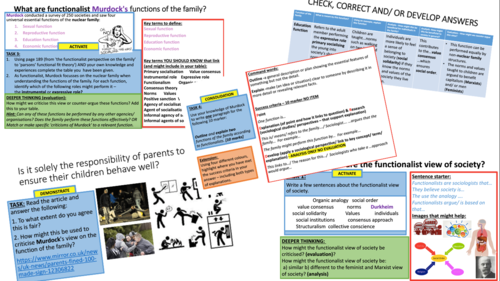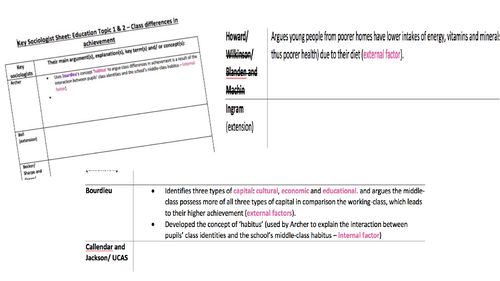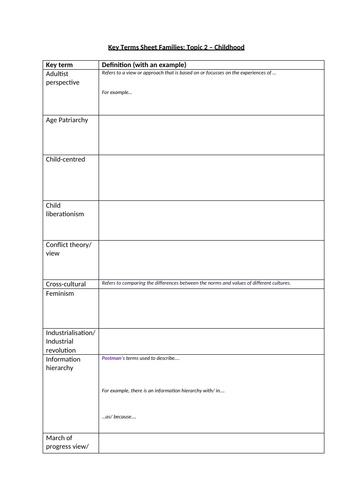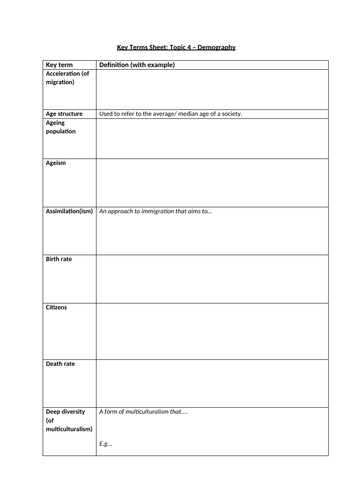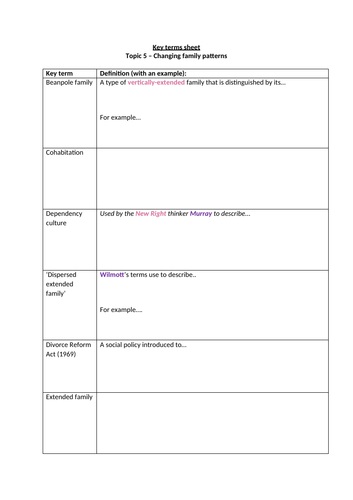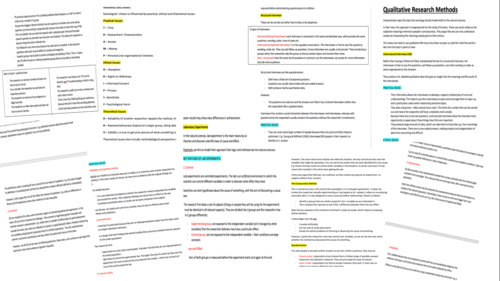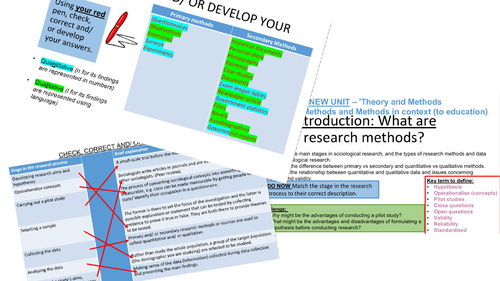
111Uploads
12k+Views
3k+Downloads
All resources

AQA A-level Sociology: Education Topic 3 Ethnic differences - Institutional racism
Detailed and differentiated (up and down) student led lesson that explores the following so students are able to understand institutional racism and explain how it might cause ethnic differences in achievement: Institutional racism, Marketisation (extension), The New IQism, Ethnocentric, Ethnocentric curriculum, Model minorities, The foundation stage profile (FSP), Aim Higher initiatives/ programmes
Covers the ideas of Troyna and Williams Gillborn, David, Ball, Sewell (as a criticism)
Covers criticisms of Gillborn’s arguments
Includes answers for MOST activities - NOTE - NO ANSWERS FOR ‘DO NOW’ but can be done on the board with students.
Makes some links to the following key terms students should know:
Internal vs External factors, Cultural vs Material factors, Social processes, Labelling, Streaming, Self-fulfilling prophecy
NOTES:
-Uses and refers to ’ AQA A Level Sociology Book One Including AS Level: Book one 3rd Revised edition by Rob Webb, Hal Westergaard, Keith Trobe, Annie Townend ’ textbook
-RESOURCES CAN BE FOUND AT THE END OF THE PPT.
Bundle

AQA A-LEVEL Sociology Education: Topic 3 - Ethnic differences - LESSONS, REVISION & KEY SHEETS
INCLUDES THE FOLLOWING:
1. LESSONS:
L1 - Cultural deprivation
Detailed and differentiated (up and down) student led lesson that introduces students to ethnic differences in achievement and explores how different aspects of cultural deprivation (language, attitudes and values, and parental structure) might cause ethnic differences in achievement. To do this, the lesson explores the following key terms: ethnic group, ethnic differences in achievement, cultural deprivation, compensatory education and makes reference to other key terms students should have previously learnt (restricted code, working-class subculture, meritocracy, internal vs external factors, cultural vs material factors)
Uses and refers to ’ AQA A Level Sociology Book One Including AS Level: Book one 3rd Revised edition by Rob Webb, Hal Westergaard, Keith Trobe, Annie Townend ’ textbook
ANSWERS FOR MAIN ACTIVITY CAN BE FOUND ON NEXT SLIDE AFTER ACTIVITY SLIDE
*STUDENT FRIENDLY MARK-SCHEME FOR 4 MARKER INCLUDED
L2 - Material deprivation and racism in wider society
Detailed and differentiated (up and down) student led lesson on how a. material deprivation and b. racism in wider society might cause ethnic differences in achievement. Makes reference to key terms material vs cultural factors, external vs internal factors, the meaning/ patterns of ethnic differences in achievement.
Uses and refers to ’ AQA A Level Sociology Book One Including AS Level: Book one 3rd Revised edition by Rob Webb, Hal Westergaard, Keith Trobe, Annie Townend ’ textbook
ANSWERS FOR MAIN ACTIVITIES CAN BE FOUND ON NEXT SLIDE AFTER ACTIVITY SLIDE
INCLUDES ORACY ACTIVITY
L3 - Negative labelling and teacher racism
Detailed and differentiated (up and down) student led lesson that explores the following so students are able to understand and explain how negative labelling and teacher racism might cause ethnic differences in achievement:
Ideal pupil identity , Pathologised pupil identity, Demonised pupil identity, Colour-blind teachers, Liberal chauvinist teachers, Overt racist teachers, Rebels subcultures, Conformist subcultures, Retreatist subcultures, Innovators subcultures
Differentiates between Gillborn and Youdell (or Bourne or Olser), Sewell, Mirza’s view of how teachers might be racist and how this might affect achievement for different groups.
Lesson makes links to the following terms that students should have covered before completing this lesson: Labelling, Self-fulfilling prophecy, Streaming, Streams A-C economy, Educational triage, Interactionism vs Structuralism, Stereotype, Ethnicity Cultural deprivation Collectivism vs individualism.
**NOTE – Students will need to have basic to reasonable knowledge of labelling and the self-fulfilling prophecy. **
Uses and refers to ’ AQA A Level Sociology Book One Including AS Level: Book one 3rd Revised edition by Rob Webb, Hal Westergaard, Keith Trobe, Annie Townend ’ textbook
L4 - Institutional racism
Detailed and differentiated (up and down) student led lesson that explores the following so students are able to understand institutional racism and explain how it might cause ethnic differences in achievement: Institutional racism, Marketisation (extension), The New IQism, Ethnocentric, Ethnocentric curriculum, Model minorities, The foundation stage profile (FSP), Aim Higher initiatives/ programmes
Covers the ideas of Troyna and Williams Gillborn, David, Ball, Sewell (as a criticism)
Covers criticisms of Gillborn’s arguments
Includes answers for MOST activities - NOTE - NO ANSWERS FOR ‘DO NOW’ but can be done on the board with students.
Makes some links to the following key terms students should know:
Internal vs External factors, Cultural vs Material factors, Social processes, Labelling, Streaming, Self-fulfilling prophecy
NOTE:
**** RESOURCES FOR LESSONS CAN BE FOUND AT THE END OF PPT
**USE and refers to ’ AQA A Level Sociology Book One Including AS Level: Book one 3rd Revised edition by Rob Webb, Hal Westergaard, Keith Trobe, Annie Townend ’ textbook
**2. REVISION LESSON **
Detailed and differentiated (up and down) student led lesson that:
uses scaffolding to guide students in making a mind-map of the topic as a revision material
-recaps the success criteria for 10 markers with item
-provides a model paragraph for a 10 marker item on this topic
-uses scaffolding to help students write their own 10 mark (item) paragraphs or full answers.
-includes 4 different 10 markers (with item). for this topic
3. KEY TERM SHEETS
Alphabetical key term sheet for AQA A-level Sociology Education Topic 3 ethnic differences in achievement that requires students to fill out the definitions themselves.
*** Includes scaffolding, e.g. some sentence starters (to model to students how to incorporate key sociologists into their definitions) and prompts to help students remember how key term links to the topic. **
*** Includes a section with key terms that students should know from previous learning(links to key terms covered in class differences in achievement, e.g. labelling, pupil identities, material deprivation, speech codes etc) that link to this topic. **
DOES NOT INCLUDE IN TABLE key terms covered in Topic 1 & 2 Class diff key term sheet, e.g. labelling and the self-fulfilling prophecy
Good form of revision for students and can be used as a revision resource to develop AO1 once filled out.
**BASED ON CONTENT textbook - AQA A Level Sociology Book One Including AS Level: Book one 3rd Revised edition by Rob Webb, Hal Westergaard, Keith Trobe, Annie Townend ’ textbook
**4. KEY SOCIOLOGISTS SHEET **
Alphabetical list of sociologists who attempt to explain ethnic differences in achievement. SOME scaffolding with some sentence starters, prompts to help students with what some sociologists might says and put into external vs internal factors categories .
Requires students to write done what key sociologists from the topic ethnic differences in achievement (external and internal factors).
Good form of revision and revision resource for the students.
**BASED ON CONTENT in textbook - AQA A Level Sociology Book One Including AS Level: Book one 3rd Revised edition by Rob Webb, Hal Westergaard, Keith Trobe, Annie Townend ’ textbook

Sociology Display -Labelling, Streaming, Differentiation, Polarisation & school subcultu
Ready to print display that shows the relationship between labelling, streaming, differentiation, polarisation, and anti and pro-school subcultures.
Specific to AQA A-level Sociology but can be simplified for GCSE or edited for another spec.

AQA A-level Sociology Families: Theories of the family - Murdock’s four functions of the family
Detailed and differentiated (up and down) student-led lesson that recaps the functionalist view of society and examines and evaluates functionalist Murdock’s four functions: Sexual function , Reproductive function , Education function , Economic function.
Lesson makes links to other functionalist and family key terms that students might have previously been taught.
Main activity makes reference to AQA A-level Book 1 by Townsend but an alternative book that covers this content can be used.
MAIN ACTIVITY INCLUDES ANSWERS
Starter assesses prior learning on Childhood topic.
WORKSHEETS AT THE END OF THE PPT

AQA A-level Sociology Education Topic 1- 2 key sociologists sheets
Detailed and scaffolded (e.g. SOME sentence starters/ prompts, model examples of what sociologists say (and what students are expected to write and how), etc.) key sociologists sheets that requires students to write done what key sociologists from education:
Topic 1 - Class differences in achievement (external factors)
Topic 2 - Class differences in achievement (internal factors)
Sociologists in alphabetical order
Good form of revision and revision resource for the students.
**BASED ON CONTENT in textbook - AQA A Level Sociology Book One Including AS Level: Book one 3rd Revised edition by Rob Webb, Hal Westergaard, Keith Trobe, Annie Townend ’ textbook

KEY TERMS SHEET - AQA A-level Sociology Families: Topic 2 Childhood
Alphabetical key term sheet for AQA A-level Sociology Family Topic 2 Childhood that requires students to fill out the definitions themselves. Includes some sentence starters for more difficult key terms.
**Good form of revision for students and can be used as a revision resource to develop AO1 once filled out. **
**BASED ON CONTENT in textbook - AQA A Level Sociology Book One Including AS Level: Book one 3rd Revised edition by Rob Webb, Hal Westergaard, Keith Trobe, Annie Townend ’ textbook

KEY TERMS SHEET - AQA A-level Sociology Families: Topic 3 Theories of the family
Alphabetical key term sheet for AQA A-level Sociology Family Topic 3 Theories of the family that requires students to fill out the definitions themselves - models example, and includes some sentence starters for more difficult key terms.
**Good form of revision for students and can be used as a revision resource to develop AO1 once filled out.
**
**Makes links (and encourages students to add) to key terms students should have learnt previously - BASED ON STUDENTS ALREADY HAVING PRIOR KNOWLEDGE of Functionalism, Marxism and Feminism - see intro lessons.
**
**BASED ON CONTENT in textbook - AQA A Level Sociology Book One Including AS Level: Book one 3rd Revised edition by Rob Webb, Hal Westergaard, Keith Trobe, Annie Townend ’ textbook

KEY TERMS SHEET - AQA A-level Sociology Families: Topic 4 Demography
Alphabetical key term sheet for AQA A-level Sociology Family Topic 4 Demography that requires students to fill out the definitions themselves. Includes some sentence starters and two definitions for more difficult key terms.
Good form of revision for students and can be used as a revision resource to develop AO1 once filled out.
**BASED ON CONTENT in textbook - AQA A Level Sociology Book One Including AS Level: Book one 3rd Revised edition by Rob Webb, Hal Westergaard, Keith Trobe, Annie Townend ’ textbook

KEY TERMS SHEET - AQA A-level Sociology Families: Topic 5 Changing family patterns
Alphabetical key term sheet for AQA A-level Sociology Family Topic 5 Changing family patterns that requires students to fill out the definitions themselves. Includes some sentence starters for more difficult key terms.
**Good form of revision for students and can be used as a revision resource to develop AO1 once filled out. **
**BASED ON CONTENT in textbook - AQA A Level Sociology Book One Including AS Level: Book one 3rd Revised edition by Rob

KEY TERMS SHEET - AQA A-level Sociology Education: Topic 2 Class differences in achievement (in)
Alphabetical key term sheet for AQA A-level Sociology Education Topic 2 Class differences in achievement (internal factors) that requires students to fill out the definitions themselves.
*** Includes scaffolding, e.g. a few sentence starters (to model to students how to incorporate key sociologists into their definitions)
*** Includes a section with key terms that students should know from previous learning.
Good form of revision for students and can be used as a revision resource to develop AO1 once filled out.
**BASED ON CONTENT textbook - AQA A Level Sociology Book One Including AS Level: Book one 3rd Revised edition by Rob Webb, Hal Westergaard, Keith Trobe, Annie Townend ’ textbook

AQA A-level Sociology: Education Revision Notes
Detailed revision notes that covers all topics (1-6) in education:
Class differences in achievement (internal and external factors)
Ethnic differences in achievement (internal and external factors)
Gender differences in achievement, subject choice and experiences in school (internal and external factors)
Role of education
Educational policy
Includes an evaluation point for most if not all arguments.
NOT EDITABLE - PDF document
Includes contents page

AQA A-level Sociology: Research Methods Revision Notes
Detailed revision notes for ‘Methods’ part of ‘Theory and Methods’ that outlines the practical, ethical and theoretical PET issues (and strengths) on the following research methods:
Experiments (the different types)
Questionnaires
Interviews (the different types)
Participant observation
Official statistics
Documents
A2 CONTENT FOR YR 13s
NOT EDITABLE - PDF doc

Sociology Education Class differences in achievement - Assessment & Feedback lesson
Asessment questions for A-level Sociology (4, 6, 10, 30 markers) AND detailed and differentiated (up and down), student led feedback DIRT lesson that explores recaps how to answer4, 6, 10 & 30 markers and provides answers for assessment. Includes student friendly success criteria AND mark-schemes.
ANSWERS TO MAIN ACTIVITIES AND EXAM QUESTIONS ARE INCLUDED
**Made for AQA A-level but can be easily be changed and used for AS Level and other specs, or differentiated down for GCSE) lesson **

Sociology Research Methods - Introduction to research methods
Detailed and differentiated student-led lesson that explores primary vs secondary methods, quantitative vs qualitative methods, validity and reliability as a way to introduce students to the main main research methods. LESSON COMES WITH ANSWERS
Can be used for ANY SPEC and GCSE but catered towards A-LEVEL AQA sociology** .
Comes with key term sheet for the lesson.

Introduction to Yr 13 Sociology
Introduction lessons that outlines the AQA A-level course, expectations, revision resources and guidance. Rest of lessons enables students to recap the AOs, ways they might develop and/ or demonstrate in. Students are directed to create AO specific goals and action plans to meet each. Lesson also teaches students how to highlight with purpose. Comes with worksheet and ANSWERS for activities.
Can be differentiated down for GCSE and can be edited to make applicable for ANY SPEC.

AQA A-Level Sociology PLCs (ALL UNITS) - EDITABLE
NOW EDITABLE - on a word document
Personal Learning Checklists for the following AQA A-level Sociology syllabus:
Education
Family
Religion
Media
Crime
Theory and Methods (includes separate PLCs for each sub-topic and a combined PLC.
Methods in context
Bundle

GCSE AQA Sociology INTRO LESSONS & QUIZ
Detailed and differentiated (up and down) student-led lessons that help students to develop their knowledge and understanding from previous lesson(s). Includes 6 lessons (the last being a quiz lesson) and a key term sheet that covers the key terms in these lessons:
**L1 – Intro to GCSE AQA Sociology: **
an overview of the course, exam and curriculum
An activity on how to create and maintain a safe space for discussions
suggested revision websites and youtube channels that students can use to develop their knowledge and understanding of key ideas and concepts.
activities to introduce students to Sociology and sociological thinking/ inquiry.
Expectations
L2 – How might sociologists explain behavior?
Explores, norms, values, socialisation (primary/secondary) and social control, agencies and agents of socialisation and social control as an introduction to Sociology.
Also looks at the importance of primary socialisation and the consequences of it inadequately performed.
3 marker with a success criteria and student friendly mark-scheme
L3 – Intro to functionalism
Explores value consensus, social order, biological/ organic analogy, structuralism, consensus theories and social cohesion as way of introducing students to the key main functionalist views and ideas.
3 marker with a success criteria and student friendly mark-scheme
L4 – Intro to Marxism
explores capitalism, profit, social class, ownership, interests, structuralism, conflict theories, exploitation, false consciousness and social relations of production as a way to introduce students to the main Marxist views and ideas.
**L5 – Intro to feminism **
explores sex, gender, gender roles, patriarchy, gender inequality as a way to introduce students to the main feminist views of society and ideas.
3 marker with a success criteria and student friendly mark-scheme
**L6 – Quiz lesson **
small revision activity –that looks at the similarities and differences between functionalism, Marxism and feminism
25 min quiz (on basic sociological concepts, key functionalist, Marxist, feminist’s ideas and terminology)
answers/ mark-scheme for quiz
scaffolding for students to peer assess (but quiz can also be marked by teacher)
SAME as A-level intro quiz but excludes questions on the nature – nurture debate.
Made to meet the needs of the AQA SPEC but can be edited to meet the needs of any spec, e.g. key terms in L2-5 meet the AQA spec
Answers included for main activities and quiz
**L2,3 & 5 include 3 marker, success criteria to answer this and student-friendly mark-scheme for self and/ or peer-assessment. **
Bundle

AQA A-level Sociology Families: Topic 1 Couples - LESSONS, KEY TERM SHEET & REVISION LESSON
Bundle for AQA A-level Sociology Couples topic in the Families unit. Bundles includes 5 lessons, a key term sheet (for students to fill out) for the topic and a revision lesson (see below for more information on each):
**LESSONS **
Most answers to main activities included. Refers to key terms from previous lessons and units students might know that link and uses and refers to ’ AQA A Level Sociology Book One Including AS Level: Book one 3rd Revised edition by Rob Webb, Hal Westergaard, Keith Trobe, Annie Townend ’ textbook. ALL RESOURCES CAN BE FOUND AT THE END ON THE PPT
L1 - Detailed and differentiated (up and down) student-led lesson that examines and analyses the following key terms to introduce students to the main family structures: Family, Household,Family structure/ type, Nuclear family, Lone-parent family, Same-sex family, Reconstituted family (or blended family) , Beanpole family, Extend family (horizontally and vertically) , Empty-nest family, Cohabitating couples, Contemporary society, Traditional, Family diversity, Living Apart Together/ LATs (extension)
L2 - Detailed and differentiated (up and down) student-led lesson that examines and analyses the following key terms to introduce students to the traditional functionalist (Parsons) view of the domestic division of labour:
Domestic labour , Domestic division of labour, Conjugal roles
Conjugal (extension), Conjugal relationships (extension), Joint conjugal roles, Segregated conjugal roles, Instrumental role, Expressive role, Conjugal relationships (extension), Pre-industrial society (extension), Industrial Revolution (extension),
Consumption (extension)
L3 - Detailed and differentiated (up and down) student-led lesson that examines and analyses the following key terms to examine march of progress and feminist views of how women’s involvement paid work has had an impact on the domestic division of labour:
Dual‐earner couples, The New man, The ‘march of progress’ view
Double shift / dual burden, Triple shift, Emotion work, Cultural/ Ideological explanation (of segregated conjugal roles), Material/ Economic explanation (of segregated conjugal roles)
Ideology, Geographic mobility (extension), Commercialisation (extension)
Examines the ideas of :Young and Wilmott, Oakley, Hochschild , Gershuny/ Sullivan, Ferri and Smith, Crompton and Lyonette
L4 - Detailed and differentiated (up and down) student-led lesson that examines and analyses the following key terms to examine how money might be managed and how decision-making might be organised in families : Power, The allowance system, Pooling, Cultural/ Ideological explanation (of decision making), Material/ Economic explanation of inequality (of decision making),Personal life perspective (of money)
Examines the views of the following sociologists:
PAHL AND VOGLER (1993), Barret and McIntosh, Kempson, EDGELL, Laurie and Gershuny, CROMPTON AND LYONETTE, Pahl
L5 - L5 AQA A-level Families- Couples: Domestic violence
Detailed and differentiated (up and down) student-led lesson that examines and analyses the following key terms to examine patterns and explanations of domestic violence: Domestic violence/ abuse, Radical feminists, Materialism,
Marxist feminism, Radical feminist explanation (of domestic violence)
Marxist feminist explanation (of domestic violence),Materialist explanation (of domestic violence)
Examines the views of the following sociologists: Dobash and Dobash, Millet and Firestone, Wilkinson and Pickett, Ansley
**KEY TERM SHEET **
Key term sheet for AQA A-level Sociology Family Topic 1 Couples that requires students to fill out the definitions themselves. Includes some sentence starters for more difficult topics.
Good form of revision for students and can be used as a revision resource to develop AO1 once filled out.
**BASED ON CONTENT in textbook - AQA A Level Sociology Book One Including AS Level: Book one 3rd Revised edition by Rob Webb, Hal Westergaard, Keith Trobe, Annie Townend ’ textbook
**REVISION LESSON - **
Detailed and differentiated (up and down), student led lesson that teaches exam skills and recaps ‘Couples’ content of AQA specification; recaps the main sociologists and themes in the ‘Family’ unit, Topic 1 – Couples WHILST teaching students how to use the Assessment Objectives (AOs) -AO1, AO2, AO3- to further develop their answers using MODEL ANSWERS and examples.
NOTE – Students will need to have gone over or have a basic understanding of using a set success criteria or writing format for their paragraphs TO BE ABLE TO GAIN THE MOST OF OUT THIS LESSON – this lesson using set success criteria PEELE/A (for 20 markers) and PERD (for 10 markers).
**RESOURCES CAN BE FOUND AT THE END OF THE PPT.
**
**ANSWERS FOR MOST OF THE ACTIVITIES CAN BE FOUND ON NEXT SLIDE AFTER ACTIVITY SLIDE
**

AQA A-level Families- Couples: Women’s involvement in paid work
Detailed and differentiated (up and down) student-led lesson that examines and analyses the following key terms to examine march of progress and feminist views of how women’s involvement paid work has had an impact on the domestic division of labour:
Dual‐earner couples, The New man, The ‘march of progress’ view
Double shift / dual burden, Triple shift, Emotion work, Cultural/ Ideological explanation (of segregated conjugal roles), Material/ Economic explanation (of segregated conjugal roles)
Ideology, Geographic mobility (extension), Commercialisation (extension)
Examines the ideas of :Young and Wilmott, Oakley, Hochschild , Gershuny/ Sullivan, Ferri and Smith, Crompton and Lyonette
***** Makes reference to other key terms students might know that link. **
****ALL RESOURCES INCLUDED AND CAN BE FOUND OUT THE END OF PPT ***
Uses and refers to ’ AQA A Level Sociology Book One Including AS Level: Book one 3rd Revised edition by Rob Webb, Hal Westergaard, Keith Trobe, Annie Townend ’ textbook

AQA A-level Families - Couples: Money management and decision making
Detailed and differentiated (up and down) student-led lesson that examines and analyses the following key terms to examine how money might be managed and how decision-making might be organised in families : Power, The allowance system, Pooling, Cultural/ Ideological explanation (of decision making), Material/ Economic explanation of inequality (of decision making),Personal life perspective (of money)
Examines the views of the following sociologists:
PAHL AND VOGLER (1993), Barret and McIntosh, Kempson, EDGELL, Laurie and Gershuny, CROMPTON AND LYONETTE, Pahl
***** Makes reference to other key terms students might know that link. **
***** ANSWERS for MAIN activities INCLUDED****
Uses and refers to ’ AQA A Level Sociology Book One Including AS Level: Book one 3rd Revised edition by Rob Webb, Hal Westergaard, Keith Trobe, Annie Townend ’ textbook




